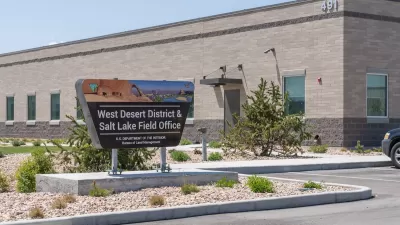The developer of the Tejon Ranch agreed to a plan to put permanent conservation easements on almost 375 square miles of ranch lands and wilderness 60 miles north of Los Angeles, in exchange for rights to develop 10 percent of its land holdings.
"Almost 90 percent of one of Southern California's best-known ranches - long the property of one of the state's best-known newspaper families - will be kept permanently free of development under the terms of a deal announced on Thursday between the ranch corporation and five major conservation organizations.
"This is the Holy Grail of conservation in California," said Joel Reynolds of the Natural Resources Defense Council. Bill Corcoran, the senior regional representative of the Sierra Club, added that the property, known as the Tejon Ranch, which reaches from the firs of the southern Sierra Nevada across the dry Tehachapi Mountains and west to the coastal range, "is the keystone for protecting Southern California's natural legacy."
In return for the commitment to allow easements on roughly 240,000 acres, the groups, including the Sierra Club, Audubon California and the Natural Resources Defense Council, will give up their opposition to industrial, resort and residential development on another 30,000 acres near Interstate 5.
The agreement brings to an end a standoff between Tejon Ranch, a publicly traded company formed after the Chandler family heirs, onetime owners of The Los Angeles Times, sold the land more than a decade ago, and conservation groups that wanted to prevent the ranchland, with its varied ecosystems, from becoming part of the sprawl of greater Los Angeles."
FULL STORY: Major Deal Preserves Ranch Land in California

Alabama: Trump Terminates Settlements for Black Communities Harmed By Raw Sewage
Trump deemed the landmark civil rights agreement “illegal DEI and environmental justice policy.”

Planetizen Federal Action Tracker
A weekly monitor of how Trump’s orders and actions are impacting planners and planning in America.

Why Should We Subsidize Public Transportation?
Many public transit agencies face financial stress due to rising costs, declining fare revenue, and declining subsidies. Transit advocates must provide a strong business case for increasing public transit funding.

Understanding Road Diets
An explainer from Momentum highlights the advantages of reducing vehicle lanes in favor of more bike, transit, and pedestrian infrastructure.

New California Law Regulates Warehouse Pollution
A new law tightens building and emissions regulations for large distribution warehouses to mitigate air pollution and traffic in surrounding communities.

Phoenix Announces Opening Date for Light Rail Extension
The South Central extension will connect South Phoenix to downtown and other major hubs starting on June 7.
Urban Design for Planners 1: Software Tools
This six-course series explores essential urban design concepts using open source software and equips planners with the tools they need to participate fully in the urban design process.
Planning for Universal Design
Learn the tools for implementing Universal Design in planning regulations.
Caltrans
Smith Gee Studio
Institute for Housing and Urban Development Studies (IHS)
City of Grandview
Harvard GSD Executive Education
Toledo-Lucas County Plan Commissions
Salt Lake City
NYU Wagner Graduate School of Public Service





























